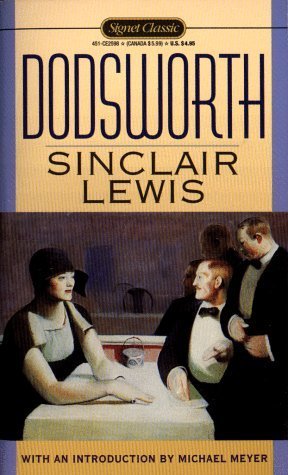Book Summary
Dodsworth (1929) follows Samuel Dodsworth, a wealthy American automobile magnate, as he embarks on a European tour with his wife, Fran, after retiring from business. What begins as a leisurely exploration of Old World charm quickly devolves into a marital unraveling, as Fran becomes enamored with European aristocracy while Sam grapples with his identity as an outsider. The novel meticulously dissects their crumbling relationship against the backdrop of 1920s transatlantic culture, blending sharp social satire with poignant introspection.
Sinclair Lewis’s penultimate novel before winning the Nobel Prize is both a biting critique of American materialism and a tender, tragic portrait of a marriage in decline. Unlike Lewis’s earlier works like Babbitt, Dodsworth offers a more nuanced protagonist—Sam is neither a caricature nor a villain, but a flawed yet sympathetic man caught between duty and self-discovery. The novel’s blend of wry humor and emotional depth makes it a standout in Lewis’s oeuvre.
Key Themes
At its core, Dodsworth explores the tension between American pragmatism and European sophistication. Sam represents the self-made industrialist—proud of his Midwestern roots but curious about the world—while Fran embodies the restless American seeking validation abroad. Lewis critiques both perspectives: Fran’s pretentious rejection of her origins and Sam’s initial naivety about Europe’s complexities. The novel also delves into midlife crises, as Sam’s retirement forces him to confront his purpose beyond work.
Another central theme is marital disillusionment. Fran’s infidelities and Sam’s passive endurance highlight the era’s gendered expectations. Lewis doesn’t villainize Fran entirely; instead, he portrays her as a tragic figure terrified of aging and irrelevance. The contrast between Fran’s desperate clinging to youth and Sam’s gradual self-acceptance underscores the novel’s meditation on time and identity.
What Makes It Unique
Unlike Lewis’s more overtly satirical works, Dodsworth balances irony with genuine pathos. Sam’s journey—from a staid businessman to a man rediscovering passion—is rendered with rare emotional depth. The novel’s European settings (London, Paris, Berlin) are vividly depicted, serving as both playground and battleground for the Dodsworths’ marriage. Lewis’s prose shifts seamlessly from witty observation to lyrical introspection, particularly in Sam’s solitary moments along the Seine or in Venetian alleyways.
The character of Edith Cortright, an expatriate widow Sam meets in Italy, provides a counterpoint to Fran. Where Fran is performative, Edith is authentic; where Fran seeks status, Edith values connection. Their dichotomy elevates the novel beyond mere cultural critique into a nuanced study of love and compatibility. Lewis’s decision to end the novel ambiguously—with Sam choosing Edith but still haunted by Fran—adds layers of realism rarely seen in literature of the period.
Reader Reactions
Modern readers praise Dodsworth for its timeless exploration of midlife and marriage. One reviewer notes, “Sam’s quiet dignity amid Fran’s theatrics makes him one of literature’s most relatable protagonists.” Others highlight Lewis’s prescient take on American insecurity abroad: “Fran’s obsession with European approval mirrors today’s social-media-driven status anxiety.” The 1936 film adaptation, starring Walter Huston, remains a favorite, with many citing its faithful yet streamlined portrayal of the novel’s emotional beats.
Critics occasionally fault the novel for its pacing—some European travelogues feel protracted—but even detractors concede its psychological acuity. As one reader observes, “Lewis’s genius lies in making Sam’s internal struggles as gripping as any plot twist.” The novel’s blend of humor and melancholy continues to resonate, particularly among readers navigating their own transitions in career or relationships.
About the Author
Sinclair Lewis (1885–1951) was the first American to win the Nobel Prize in Literature (1930), celebrated for his satirical portrayals of middle-class America. Works like Main Street and Babbitt established him as a sharp critic of conformity and materialism. Lewis’s own tumultuous marriage to journalist Dorothy Thompson reportedly inspired Dodsworth’s marital strife, lending the novel an autobiographical edge.
Though less overtly political than contemporaries like Upton Sinclair, Lewis’s focus on societal hypocrisies—particularly in religion (Elmer Gantry) and medicine (Arrowsmith)—cemented his legacy. Dodsworth marked a turning point, blending his signature satire with deeper character studies. Today, he’s seen as a bridge between Twain’s frontier humor and Fitzgerald’s Jazz Age introspection.
Memorable Quotes
“He was, indeed, so confidently happy that he completely forgot Fran and he did not again yearn over her, for almost two days.”
— The novel’s closing line, capturing Sam’s bittersweet liberation.
“I’m delighted, of course. Dear Emily! She’ll be so happy. But, Sam, don’t you realize that Kurt—oh, I don’t mean Kurt individually—they think of me as young. Young! And if they know I’m a grandmother—God! A grandmother! Oh Sam, can’t you see? It’s horrible! It’s the end, for me!”
— Fran’s panicked reaction to becoming a grandmother, revealing her fear of aging.
